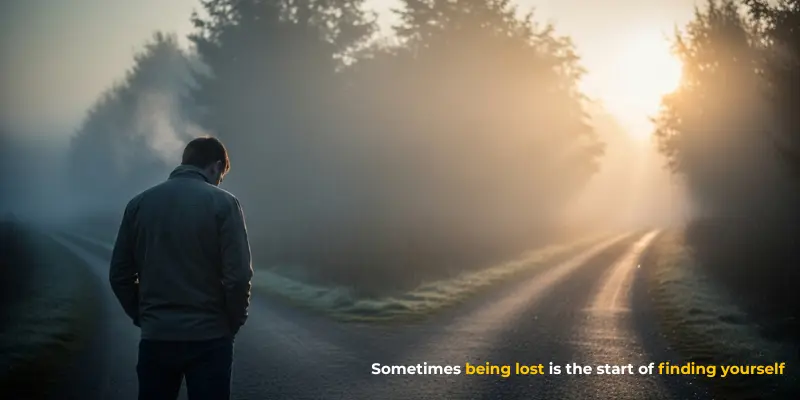7 Powerful Ways to Overcome Feeling Lost in Life
Published: 27 Dec 2025
When did you last sit alone and ask yourself, “Where is my life going?” I did once. I felt heavy inside, like walking in a fog with no map. That is what people call feeling lost in life. It means you don’t know what to do next, or which way to go. Many young people feel this way at some point in their lives.
In this article, I will share why we feel lost, what it truly means, and simple ways to regain direction.
Not all those who wander are lost.J.R.R. Tolkien
By the end, you will learn how to turn confusion into small steps of hope. Think of this article as a flashlight, illuminating a clear path forward.
Feeling Lost in Life: A Shared Human Experience
I once sat at my desk, books open, phone buzzing, yet my heart felt empty. I wasn’t tired of work or even bored. I simply didn’t know why I was doing any of it. This quiet emptiness is what many refer to as feeling lost in life. It’s not just students; it happens to young professionals, parents, and successful leaders. Like a maze with no exit, this season comes to almost everyone.

Why Our Minds Search for Meaning
Psychologists say this is normal. Humans are wired to seek meaning. Viktor Frankl, who studied the human spirit’s struggles, wrote that our greatest need is not comfort but purpose (source). When life feels unclear, our minds ask questions, pushing us to seek direction again.
Lost Does Not Mean Failed
If you feel lost, remember: it’s not failure. It’s standing at a crossroads. The fog is not the end; it is the beginning. Feeling lost means you are in a state of transition, searching, and ready to grow.
The Psychology Behind Feeling Lost
The mind is like a compass; it always wants to point us in a certain direction. But when the direction is unclear, we feel lost. I remember staring at my notebook once, knowing I had tasks to do, but my brain kept asking, “Why does this even matter?” That confusion is not weakness; it’s how our brain responds when life feels uncertain.
Let’s see three reasons why this happens.
1. Your Brain in Uncertainty
When things are unclear, the brain’s “alarm system” (the amygdala) switches on. This can evoke feelings of fear, worry, or restlessness. I often felt it before making big choices; not scared of the choice itself, but of the unknown future behind it.
2. The Identity Crisis Effect
Psychologist Erik Erikson said young people often face “identity vs. role confusion’’(source). This means we try on different roles, such as being a student, a worker, or a friend, but sometimes none of them feel quite right. I went through this too, changing my dreams again and again, like trying on shoes that never fit.
3. The Purpose Gap
In today’s world, we face endless options. Too much choice often makes us freeze instead of move. It’s like standing in front of many doors, not knowing which one leads home. Feeling lost here is not failure; it’s the first step toward clarity.
A Story of Finding Clarity
Sara was a fresh graduate with big dreams but no clear path. Every day felt like walking through fog; jobs didn’t excite her, and advice from others only confused her more. I could see myself in her because I once felt the same way after leaving school, carrying questions that were heavier than my backpack.
The Turning Point
One evening, Sara started journaling. She wrote down her values; things that truly mattered to her, not what others expected. It was like cleaning a dusty mirror; slowly, her reflection became clearer. I remember doing this too, writing in a small notebook until my scattered thoughts turned into a simple plan. Research even shows that journaling helps reduce stress and increase clarity of thought (Harvard Health, 2018).
Clarity Through Action
With each page, Sara’s choices became easier. She realized she wanted a job that connected her to helping people, not just earning money. Just like a traveler finding a map, she felt her direction return. Feeling lost was not the end of her story; it was the beginning of her growth.
Why Feeling Lost Can Be a Turning Point
Being lost often feels scary, but it can also be a hidden gift. It shows that one chapter is closing and another is waiting to begin. Like standing at a crossroads, this moment prompts you to look deeper and choose a path that truly aligns with who you are.
Lost Means “In Between,” Not the End
When I first felt lost, I thought it was the end of my story. However, I later learned it was just a pause between chapters. Like a book where the hero rests before the next adventure, being lost is simply a waiting room before new beginnings. This understanding led me to realize that struggle often has a greater purpose.
In the middle of every difficulty lies opportunity.Albert Einstein
Struggle Can Lead to Growth
Psychologists refer to this as Post-Traumatic Growth (PTG), the concept that struggles often lead to increased meaning and strength (source).
I remember failing an important exam once. At first, I felt broken. But that moment pushed me to question my path, and it gave me a deeper sense of purpose than success ever could. Building on this, feeling lost can actually become a meaningful invitation rather than a setback.
An Invitation, Not a Curse
Feeling lost is not a curse; it’s an invitation. It’s life asking you to slow down, listen, and find direction again. Just like dawn slowly replaces the night, clarity often follows confusion. What feels like darkness today can be the first light of a new beginning. Instead of running from it, we can treat it as an open door to growth.
Practical Ways to Navigate Feeling Lost
Feeling lost may seem heavy, but it can be handled step by step. Think of it like walking through a dark room; you don’t need to see the whole space; you just need to find the next light switch. These small, practical actions can help you move forward without pressure.
Pause and Observe
Instead of rushing to fix everything, take a pause. Sit with your feelings and name them. I once wrote down my worries in a notebook, and the page felt lighter than my mind. Mindfulness or journaling works like a mirror, showing you what’s really happening inside.
Research from the University of Texas found that descriptive writing can lower stress and improve emotional clarity (Pennebaker, 1997).
Reconnect With Your Inner Compass
Ask yourself simple questions:
- What gives me energy?
- What makes me tired?
These answers often point toward your direction. I remember realizing that helping friends with their problems gave me energy, while long, empty tasks drained me. Your inner compass is always there; you just have to listen.
Design Micro-Experiments
Don’t wait for one “big answer.” Instead, test small things. Try a new habit, join a club, or explore a hobby. I once tried volunteering for just a week, and it taught me more about myself than months of overthinking. Small steps often uncover big truths.
Seek Mirrors, Not Maps
No one can hand you a perfect roadmap. However, mentors, friends, or supportive communities can act as mirrors, reflecting your strengths back to you. I found this when a teacher once pointed out talents I never noticed. Instead of looking for a fixed path, look for reflections that help you see yourself clearly.
The Deeper Side: When Feeling Lost in Life Persists
Sometimes, the feeling of being lost doesn’t pass quickly. It stays like a heavy cloud that won’t move, even when life seems fine from the outside. For me, there was a season where I smiled at others but felt empty inside. That silence inside scared me more than any noise outside.
When Lost Feels Like More
There’s a difference between normal confusion and something deeper. If the emptiness starts turning into constant sadness, hopeless thoughts, or anxiety that never rests, it may be more than just feeling lost.
Psychologists remind us that long-term emptiness can be linked to depression or anxiety, and it’s important to notice these signals early.
Sometimes when you’re in a dark place you think you’ve been buried, but actually you’ve been planted.Christine Caine
Therapy As a Form of Strength
Many people believe therapy means weakness, but that’s not true. Talking to a therapist is like visiting a coach for your mind.
I once spoke with a counselor during a confusing stage, and the relief I felt after sharing my thoughts was a turning point. Seeking help is part of self-development, not a sign of failure.
Building Hope Step By Step
If the weight feels too heavy, start with small increments. Reach out to a trusted friend, practice simple breathing exercises, or schedule one session with a professional. Like carrying a heavy bag, sharing it with someone else doesn’t erase the weight, but it makes the journey easier. Healing begins with one brave step.
- Psychologists say 80% of young adults feel directionless at least once in their 20s.
- J.K. Rowling admitted she felt completely lost before writing Harry Potter.
- The Japanese concept of “ikigai” means “reason to get up in the morning”, a remedy for lostness.
- Research shows that uncertainty boosts creativity because the brain searches for new patterns.
Conclusion
Feeling lost in life is not the end of your story; it’s simply a pause before your next chapter. I know this because I’ve been there, and what helped me most was slowing down and journaling my thoughts.
My personal recommendation is simple: treat this season as an opportunity to listen to yourself more deeply. The path may not be clear today, but it will unfold as you keep walking.
Start writing your next chapter now; your clarity is closer than you think.
Frequently Asked Questions
When people finish reading about feeling lost in life, they often want practical answers. Here are some of the most frequently asked questions by beginners, students, and young professionals.
Yes, it’s completely normal. Everyone goes through phases where life feels unclear or directionless. In fact, it can be a signal that you’re ready for growth and change.
Start by slowing down and observing your emotions without judgment. Journaling or practicing mindfulness can help you understand what’s truly going on inside. Small self-awareness steps lead to bigger clarity.
Yes, it can. Psychologists refer to this as Post-Traumatic Growth, the concept that struggles often lead to increased strength and meaning. Sometimes confusion is the doorway to discovering your real passions.
Students often feel lost when academic pressure or career choices feel overwhelming. Taking small steps, such as exploring new subjects, hobbies, or talking to mentors, can make the journey lighter. Remember, you don’t need to have it all figured out right now.
Absolutely. Many young professionals hit a point where their job feels unfulfilling or unclear. Instead of rushing, experimenting with new skills or networking can bring a fresh direction.
Talking to trusted friends or mentors can be helpful because they often see strengths that you might overlook. Keeping it all inside can make the feeling heavier. Sharing your thoughts opens the door to support and new perspectives.
It depends; sometimes it’s a few weeks, other times it lingers longer. The key is what you do during this phase: staying curious, taking small steps, and seeking help if needed. Action often shortens the season of confusion.
Purpose is not always a single, grand discovery; it can be built through small, meaningful choices. Even helping one person or trying something new adds value to your life. Over time, these moments connect into a bigger picture.
| References: |
|---|
|

- Be Respectful
- Stay Relevant
- Stay Positive
- True Feedback
- Encourage Discussion
- Avoid Spamming
- No Fake News
- Don't Copy-Paste
- No Personal Attacks

- Be Respectful
- Stay Relevant
- Stay Positive
- True Feedback
- Encourage Discussion
- Avoid Spamming
- No Fake News
- Don't Copy-Paste
- No Personal Attacks




